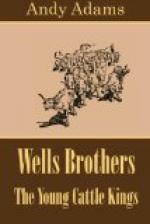“Certainly. We met the wolves before and held the cattle. You seem to forget that we’re not entitled to sleep any in the winter. Be grateful. Thank the wolf and go to sleep.”
“See how the dunes loom up in the light of this camp-fire. I wish Mr. Paul could see it.”
“More than likely he has camped in the dunes and enjoyed many rousing fires.”
Dell’s next remark was unanswered. The stars twinkled overhead, the sandman was abroad, curfew sounded through the dunes, and all was quiet.
“Here’s where we burn the wagon,” said Joel, as he aroused Dell at daybreak. “It’s one of Mr. Quince’s remarks, but this is the first time we’ve had a chance to use it. I’ll divide the corn into three good feeds, and we’ll make it in home for supper. Let’s have the whole hummingbird for breakfast, so that when we ride out of this camp, all worth saving will be the coffee pot and frying pan. So long as we hold the cattle, who cares for expense.”
The herd was in hand as it left the bed ground. An ideal spring day lent its aid to the snailing cattle. By the middle of the afternoon the watershed had been crossed, and the gradual slope clown to the Beaver was begun. Rowdy forged to the lead, the flanks turned in, the rear pushed forward, and the home-hunger of the herd found expression in loud and continued lowing.
“I must have been mistaken about the spirit of this herd being killed,” observed Dell. “When I left you the other day, to go after a pack horse, these cattle looked dead on their feet. I felt sure that we would lose a hundred head, and we haven’t lost a hoof.”
“We may have a lot to learn yet about cattle,” admitted Joel. “I fully expected to see our back track strung with dead animals.”
The origin of the herd, with its deeps and moods, is unknown and unwritten. The domesticity of cattle is dateless. As to when the ox first knew his master’s crib, history and tradition are dumb. Little wonder that Joel and Dell Wells, with less than a year’s experience, failed to fully understand their herd. An incident, similar to the one which provoked the observation of the brothers, may explain those placid depths, the deep tenacity and latent power of the herd.
After delivering its cargo at an army post, an extensive freighting outfit was returning to the supply point. Twelve hundred oxen were employed. On the outward trip, muddy roads were encountered, the wagons were loaded beyond the strength of the teams, and the oxen had arrived at the fort exhausted, spiritless, and faint to falling under their yokes. Many oxen had been abandoned as useless within one hundred miles of the post, thus doubling the work on the others. On the return trip, these scattered oxen, the lame and halt, were gathered to the number of several hundred, and were being driven along at the rear of the wagon train. Each day added to their numbers, until one fourth of all the oxen were being driven loose




